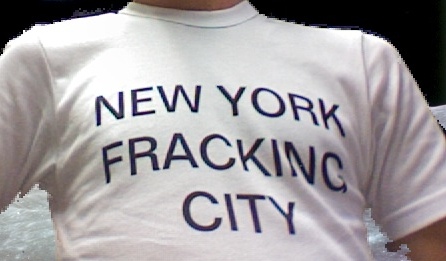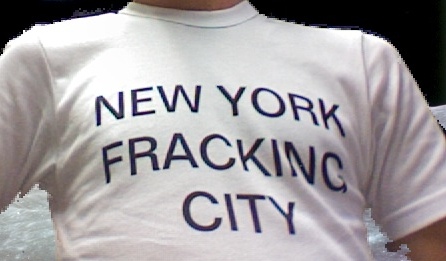The New York Times got its ink-stained hands on a report from the New York Health Department assessing the risks associated with fracking, the primary issue at play as the state considers whether or not to lift a ban on the practice. While the report suggests that fracking doesn’t pose risks, there are at least two gigantic caveats. From the Times:
The state’s Health Department found in an analysis it prepared early last year that the much-debated drilling technology known as hydrofracking could be conducted safely in New York, according to a copy obtained by The New York Times from an expert who did not believe it should be kept secret. …
The eight-page analysis is a summary of previous research by the state and others, and concludes that fracking can be done safely. It delves into the potential impact of fracking on water resources, on naturally occurring radiological material found in the ground, on air emissions and on “potential socioeconomic and quality-of-life impacts.” …
Emily DeSantis, a spokeswoman for the State Department of Environmental Conservation, said the analysis obtained by The Times was out of date. “The document you have is merely a summary, is nearly a year old, and there will be substantial changes to that version,” she said.
Can you spot the caveats? Yes, the report is an aggregation of existing research, not new reporting on any health effects. And, yes, it’s outdated.
Last November, New York Gov. Andrew Cuomo pushed out a deadline for making a final decision so that the state could do more research on fracking’s health effects. The release of this report makes clear why that was a natural next step: With only a cobbled-together set of data on how the practice could affect New Yorkers, it would be hard for Cuomo to make a strong case for lifting a ban. An upstate political blog spoke with a Sierra Club representative following release of the report.
“The position that the impacts of fracking can be regulated to ‘below levels of significant health concern’ is pure fantasy and it is understandable why (Gov. Andrew Cuomo) did not press forward with these baseless conclusions last year,” said Roger Downs, conservation director of the Sierra Club Atlantic Chapter.
The Times didn’t include the report in its coverage, but the site Journalist’s Resource has a good overview of existing research and reporting on the topic. Among the reports included there is one from the Proceedings of the National Academy of Sciences which looks specifically at shale fracking in New York and Pennsylvania.
In aquifers overlying the Marcellus and Utica shale formations of northeastern Pennsylvania and upstate New York, we document systematic evidence for methane contamination of drinking water associated with shalegas extraction. In active gas-extraction areas (one or more gas wells within 1 km), average and maximum methane concentrations in drinking-water wells increased with proximity to the nearest gas well and were 19.2 and 64 mg CH4 L −1 (n ¼ 26), a potential explosion hazard; in contrast, dissolved methane samples in neighboring nonextraction sites (no gas wells within 1 km) within similar geologic formations and hydrogeologic regimes averaged only 1.1 mg L −1 (P < 0.05; n ¼ 34).
Emphasis added, to highlight the health risk. The area in New York considered in that research lies on the state’s southern border — the area most likely to see approval of the fracking process.
New York isn’t alone in its skepticism. Large cities across the country are beginning to ban the practice within city limits.
Some cities, even those in the heart of oil and gas country have moved to ban fracking within their limits. Tulsa, Oklahoma, (once the self-proclaimed oil capital of the world) has completely banned fracking within the city limits. Planning for the first ever natural gas well in the city of Dallas was blocked last week, and the town of Longmont, near Denver, is currently battling attempts to overturn its own fracking ban.
Meaning that even if Cuomo feels comfortable in lifting the state’s ban once a more thorough health assessment has been completed, the odds that we see fracking wells in Central Park remain pretty slim.





